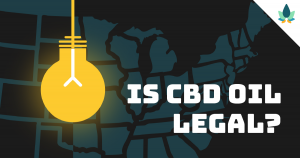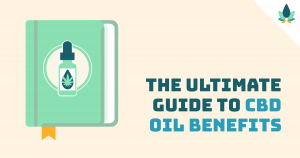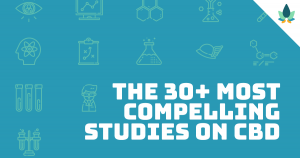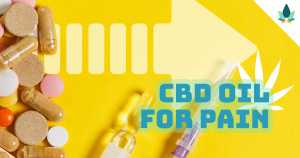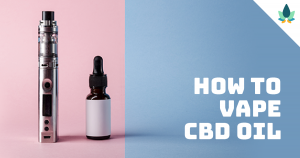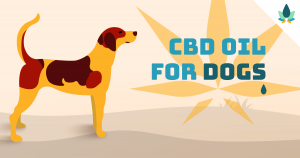Cannabidiol – or CBD – has been making big waves with good reason: it has demonstrated its ability to serve as an alternative to multiple traditional drugs, from pain relievers to anti-depressants and beyond.
Lately, it’s been gaining attention in another area: CBD may provide targeted benefits to athletes looking to recover from regular workouts, heal nagging injuries and even increase stamina.
But, a cannabis plant derivative like CBD for improving athletic performance and post-workout recovery? It might not be that far of a stretch. The need – and industry to meet that need – is growing rapidly. From CBD sports supplements to creams to vaping oils, athletes are taking notice of serious potential health benefits and adding the compound to their routines.
Throughout this article, we’ll answer common questions including:
- Can athletes take hemp oil CBD?
- Does CBD help with workout recovery and muscle soreness?
- What other benefits does CBD provide for athletes?
- What’s the best use of CBD for athletic performance?
- Does CBD have psychoactive effects?
- And more!
Wondering if CBD is right for you and your specific athletic needs? Let’s dive in.
Before Diving In: Is CBD Permitted In Competition?
Whether you’re a professional athlete, one who takes your sport seriously and devotes a lot of time to it, or someone who dabbles in fitness, there are a few things to understand.
For those who must comply with World Anti-Doping Agency, or WADA, standards, CBD is permitted in competition. However, CBD is the only cannabinoid that is legal in applicable sports. If a CBD product contains any other cannabinoid – even in trace amounts – you could be disqualified or face penalties. (1)
For all other athletes, general laws still apply. Under the Farm Act of 2018, hemp and CBD sourced from hemp is now legal – on a federal level – across all 50 states. However, CBD sourced from marijuana plants are still subject to state laws, much like recreational and medicinal marijuana.
Feeling more confident in your decision to add CBD to your performance and recovery regimen? Great. Moving on…
Athletic Recovery Starts with Athletic Gains: The Science
As many seasoned athletes are aware, recovery is often just as important as an actual workout. There’s a reason runners taper before big races, why NFL players only compete once a week, and why rest intervals are built into strength training: recovery is key to improvement, to gains. Failing to recover with intention can lead to muscle breakdowns, immune system deficiencies, chronic pain, injuries and more.
While the human body is composed of numerous muscles, right now, we’ll focus on the 650 skeletal muscles inside the body, which are composed of specific muscle fibers. This composition allows muscles to contract – the better you’re able to contract, the stronger you become.
Basic? Yes. Important? Also, yes.
This is where CBD for athletic recovery comes into play. While products like CBD recovery cream can reduce the soreness associated with the recovery process (gains are painful!), taking the product internally could potentially help speed the process along thanks to its role as an anti-inflammatory.
While recovery can feel counter-intuitive, especially those anxious to see improvement, it’s important for growth and injury-prevention.

Workout:
Breaks Down Muscle Fibers

Fibers Rebuild:
Muscle Gets Stronger

Add CBD:
Reduces Recovery Time
CBD For Muscle Recovery
We know CBD is permitted under various agency rules, and we understand the science behind athletic gains and recovery. So, let’s look at specific CBD benefits for athletes, and how it aids muscle recovery in more detail.
While the breaking down of muscle fibers – as we discussed earlier – is important for gains and growth, the excess inflammation it can cause within the body is not desirable. When muscles are unable to recover due to excess inflammation, athletes are more at risk of becoming run down, becoming injured, and even becoming ill due to a decreased immune response.
In some cases, the effects of athletic inflammation are severe. Excess muscle breakdown can elevate serum blood urea nitrogen and creatinine levels, which can cause kidney problems, muscle death and more. In extreme cases, this can lead to rhabdomyolysis, a condition especially prevalent in the crossfit world.
CBD’s natural anti-inflammatory properties make it an optimal addition to any muscle recovery routine. That’s because – as multiple studies have demonstrated – the compound exerts antioxidant effects that decrease inflammation and “loosen” muscles by decreasing spasticity that often plagues athletes. It has also shown promise in reducing excess urea nitrogen and creatinine levels, leading to a lower risk of severe complications like the aforementioned rhabdomyolysis. (2)
Why Does It Work?
CBD helps reduce inflammation while aiding in muscle recovery because of the way it interacts with the endocannabinoid system. The endocannabinoid system, which enables balance throughout the entire body, consists of two primary receptors and multiple enzymes that are activated by cannabinoids like CBD. When CBD activates the endocannabinoid system, the key processes involved with inflammation inside the body are disrupted due to excess oxygenation and an exchange of substrates and metabolites, leading to enhanced recovery and reduced discomfort. (3)
Put simply: muscle recovery is activated while inflammation is reduced.
Instead of relying on over the counter anti-inflammatory drugs, like ibuprofen, many athletes are turning to CBD to recover quicker. The studies and findings above seem to support this trend.
CBD And Muscle Growth
It’s natural, based on this information, to assume that if CBD helps muscles recover, it could also help them grow by aiding in the recovery process.
For those who focus primarily on strength building, CBD offers an additional benefit. Many bodybuilders depend on a variety of supplements to help muscles grow. CBD cannot replace all of them, but, it plays an interesting role as a potential anti-catabolic.
For those unfamiliar, anti-catabolic supplements reduce the production of catabolic hormones. These hormones contribute to muscle loss. CBD works in a similar manner by activating the endocannabinoid receptors we discussed earlier, leading to an anti-catabolic response. This means that, when activated, the endocannabinoid system can reduce the risk of muscle loss, while helping muscles recover – and grow – faster.
CBD For Sprains And Athletic Injuries
Sometimes, injuries are simply unavoidable. They’re a natural consequence of living an athletic lifestyle. When they do occur, CBD may be able to help.
Athletes often face overuse injuries, sprains and other muscle setbacks that can lead to decreased performance, training delays and, of course, discomfort.
Good news! CBD can not only help reduce discomfort; it can also aid in reducing recovery times.
One of CBD’s most documented use cases is pain relief, which we cover pretty extensively here at CBD Central. You can read more in our other pieces, but, the basic science is this: we feel pain because of the neurons in our central nervous system fire at an increased rate in response to injuries inside our bodies.
When activated by CBD, the endocannabinoid receptors help reduce the rate at which these neurons fire, thus reducing discomfort and our overall sensation of pain. In this way, CBD works similarly to traditional pain relievers, but, without the risk of withdrawal, digestive issues and other potentially dangerous side effects. Because of this, when a sprain or other injury occurs, turning to CBD may be a great first alternative to popping a few pills.
Secondly, because CBD reduces inflammation and aids in muscle recovery, as mentioned above, it could reduce the actual healing time when an injury occurs, getting you back on your feet faster than you might expect. Of course, taking the proper precautions and easing back into your routine is absolutely necessary as well – no substance can replace common sense when it comes to injury recovery.
CBD And Stamina: The Missing Link
It’s clear: CBD helps with athletic recovery and could be a great addition to your workout and health regimen. But, there’s more. Here’s how CBD provides an athletic edge…really!
Strength isn’t everything for all athletes. In fact, while muscle building and exercise are critical for runners, rowers and other “distance” athletes, endurance is of equal importance. For these athletes, the “runner’s high” that many of us associate with being able to go farther, for longer periods of time, is essential for success.
To achieve this boost, many athletes turn to energy bars, caffeine and other supplements designed to help in both training and actual distance events. Recent studies have shown, however, that the runner’s high, or release of endorphins that many of us equate with success, might have more to do with the endocannabinoid system than we ever could have imagined.
A recent study found that without an intact and activated endocannabinoid system, a “true” runners high, regardless of the endorphins released during exercise, may be unobtainable. Because CBD helps balance and activate the endocannabinoid system, it could actually be the key to increased endurance and stamina that many athletes spend their entire careers trying to achieve. (4)
Best CBD Products For Recovery And Athletic Needs
So. What’s the best CBD cream for athletes? Is vaping an effective way to see results? How can you take CBD internally to aid in muscle recovery? What products should you start with?
There’s not necessarily a “right” answer to these questions. In fact, the answer to most would be: “it depends.” What is clear, however, is that there are a variety of options for athletes looking to add CBD to their routines.
Let’s check out a few:
VAPE PENS
Yes, you can vape CBD oil. But, what does vaping do to your lungs? The jury is still out. Vaping CBD can provide almost instantaneous relief, especially when combined with other calming substances, like lavender, but, for those looking to improve lung performance, it might not be the best first choice.
EDIBLES
Various products have hit the market that incorporate CBD into edibles athletes already rely on: protein bars, protein powders, and more. If your goal is standard recovery and relief, these might help you incorporate CBD without having to change much of what you already do.
CREAMS AND TOPICAL LOTIONS
Various products have hit the market that incorporate CBD into edibles athletes already rely on: protein bars, protein powders, and more. If your goal is standard recovery and relief, these might help you incorporate CBD without having to change much of what you already do.
TINCTURES
Providing relief in as little as 20 minutes, tinctures and CBD isolates might be a great addition to your gym bag. Taken under the tongue, the body rapidly absorbs CBD in this form, allowing muscle recovery to begin rapidly.
CAPSULES
For athletes interested in precise dosing, capsules – often marketed as “health supplements” could be ideal. Capsules can be taken like any other vitamin supplement on a regular basis for maintenance, chronic pain management, and long-term muscle recovery and performance improvement stemming from the anti-inflammatory effects of CBD.
These are just a few options available to athletes. New products are being introduced to the market on a regular basis. Remember, what works for one person might not be what works for you. Experiment with these and other options to find your optimal CBD product routine. For more details on how to take CBD, check out our more detailed piece, here.
CBD Oil Dosage For Athletes: How Much Should You Take?
One area of research that is lacking in many regards is what dosage of CBD is right for users, athletes included. Because of this, most professionals recommend starting with a relatively low dose – 10-50mg per day – and working up until the right dose is found.
The positive to this is that it’s impossible to “overdose” on CBD like traditional drugs. The negative effects of CBD are minimal, boiling down to basic discomforts that are rare. While taking too much – as in an extreme amount – could lead to digestive discomfort or headaches, CBD prevents no risk of dependence or other negative effects. This gives the athlete’s room to work with as they try CBD.
Your needs, as an athlete, are different than anyone else’s. This means your CBD use may look different from others. But, a few things remain certain:
- CBD can help with muscle gains, recovery and even better sleep.
- CBD can improve endurance and stamina when taken regularly.
- CBD – when free of THC – is permitted under most current athletic organization rules and regulations.
- CBD provides benefits that go beyond standard muscle recovery and could be beneficial for a wide variety of individuals.
Ready to give it a go? Great! We’d love to hear your experience when you do!


